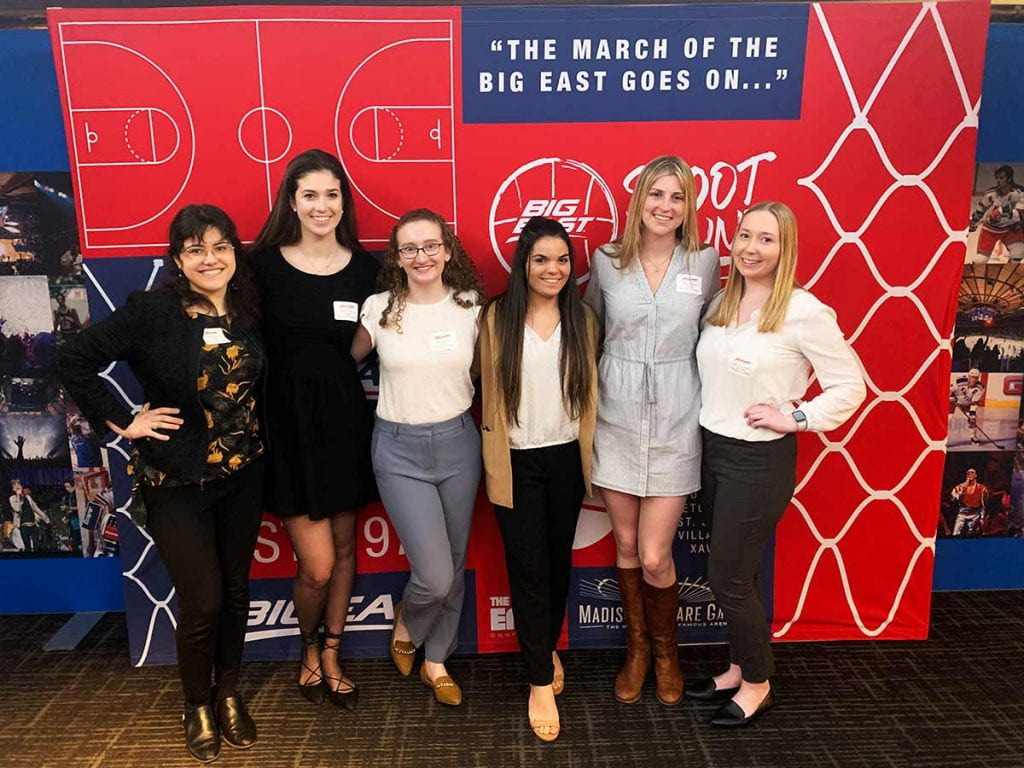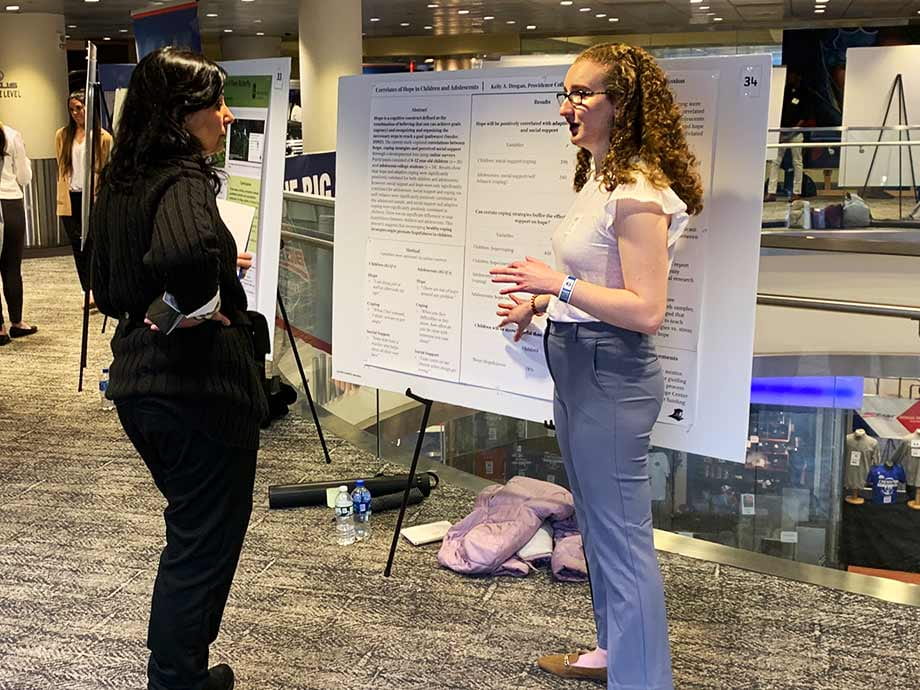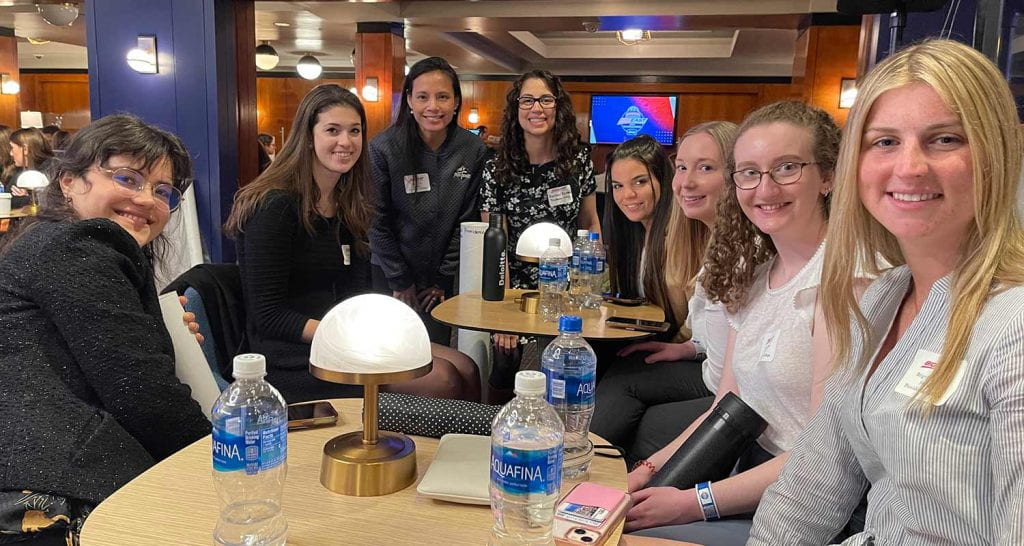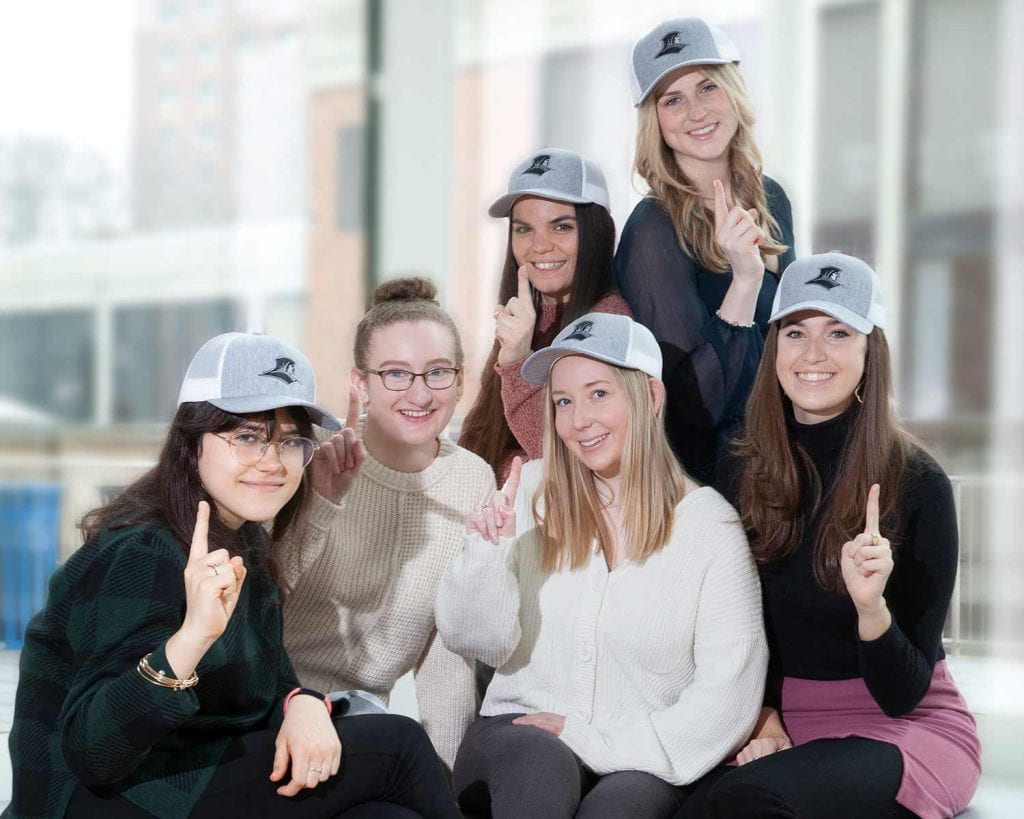Research at the world’s most famous arena

By Michael Hagan ’15, ’19G
Six Providence College students competed in the inaugural BIG EAST Research Symposium at Madison Square Garden in New York City on Saturday, March 12, 2022. The competitors, chosen through a highly selective process administered by the Center for Engaged Learning at PC, presented projects to judges representing each BIG EAST school.
It was an early wakeup for the six students, who reported to Madison Square Garden at 8 a.m. to set up their displays. Emotions were mixed as they sat together in the Chase Square Lobby. The Friars’ men’s basketball team was eliminated from the BIG EAST Tournament the night before by the Creighton Bluejays. Some of the student researchers attended the game. Others watched at nearby locations. All were hoping to see the Friars play in the championship game Saturday night, to which each participant received a complimentary ticket.
As Grace Maffucci ’22 (Mamaroneck, N.Y.), who presented research on Afro-Cuban identity and art, put it Saturday morning, “We’re Providence’s last chance at a title this weekend.”
But disappointment in the Friars’ loss was outweighed by palpable anticipation of the morning’s research competition. It felt much like walking into a basketball game as competitors and judges went through a security check and ascended the escalators to the venue.
The students huddled around two small tables with Rachael Bonoan, Ph.D., assistant professor of biology and one of the judges representing Providence College at the symposium, as they awaited the opening of the event.
We’re Providence’s last chance at a title this weekend.”
Grace Maffucci ’22
Val Ackerman, commissioner of the BIG EAST, and Michael Sainté, the BIG EAST’s senior director of compliance and membership services, opened the program by remarking on the collaboration between member schools and how excited they were to include an academic symposium as part of the conference’s highest-profile event of the year — the BIG EAST Men’s Basketball Tournament.
“The BIG EAST is very proud to be associated with New York and with this building,” said Ackerman. Referencing the turbulent years of realignment that birthed the current 11-team conference, she added, “Despite all the change the conference has been through, this tournament at Madison Square Garden is a constant for our league.”
Dr. Juliane Strauss-Soukup, vice provost at Creighton University and chair of the symposium planning committee, spoke of a passion for undergraduate research held in common by the academic leadership of each BIG EAST school.
“Just think of the impact research has had on you and you’ve had on your fields. Think of the discoveries you’ve achieved, the data you’ve analyzed, the texts you’ve studied, and the innovations you’ve made,” Strauss-Soukup said to the dozens of students assembled.
After a short speaking program, competitors were dismissed to their poster displays and judging began. The scene was a winding series of posters lining both sides of the lobby’s foyer — 55 projects in all. The Friar competitors were only mildly disappointed to find themselves at the very end of the trail of displays, with Kelly Drogan ’22 (South Walpole, Mass.) and her display nearly at the exit.
“No respect,” one student joked.

The six Friar competitors waited patiently for judges to trickle through the hall. There were nerves, but there was excitement over the opportunity to be evaluated on the many months of work that went into their projects.
One by one, judges began to arrive at the students’ displays. Each project was formally evaluated by three judges, but judges and other attendees were eager to hear from as many presenters as possible.
Conversing with one judge, Brigid McEvoy ’23 (Brooklyn, N.Y.) described the feeling of having learned an entire system of shorthand to decipher the journals of early New England preacher and poet Michael Wigglesworth.
“To know that I know this language and to know that there’s so much written in Shelton Shorthand left untranslated is really incredible,” McEvoy said.
Questions from the judges varied based on their familiarity with each project’s subject.
Biochemistry major Sophia Moniodes ’22 (Middlebury, Conn.) noted, “One of our judges had a science background, the others didn’t, so they asked different kinds of questions.”
Her research partner, Erin Ostrowski ’22 (Little Silver, N.J.) added, “But the questions from each were all very good.”
Moniodes and Ostrowski presented their research on structural, electrochemical, and catalytic properties of zinc and iron complexes containing redox active ligands — a topic not immediately accessible to most outside of the scientific community. Part of the challenge and fun of the symposium was tailoring presentations to judges’ varying levels of expertise.
“My presentation got better each time I gave it,” said Isabelle Heron ’23, who presented research on a rare butterfly species’ relationship with host plants. “It was less of a presentation and more of a conversation.”
“The judges are genuinely interested in our work. They’ve all told us we should be proud,” said Drogan, who presented psychological research on hope in children and adolescents. “This opportunity has been so cool.”
This project helped me find a passion for research I didn’t know was there. It’s like a giant puzzle. It’s very rewarding. Whatever I do next in life and for my career, it will involve research skills”
Brigid McEvoy ’23
There was one question it seemed every judge asked each student: “What’s next?”
Ostrowski was quick to answer, “Now that we’ve confirmed our hypothesis, we’re still doing reactions with acids and carbon dioxide.” That was before she realized that the judge meant what’s next for the graduating senior in life.
“This project helped me find a passion for research I didn’t know was there. It’s like a giant puzzle. It’s very rewarding. Whatever I do next in life and for my career, it will involve research skills,” McEvoy said.
The symposium was no sideshow to the basketball tournament. It reflects the BIG EAST’s legacy and continuing prioritization of academic excellence
“The tournament is our highest profile event. This symposium is a unique opportunity to highlight the academic achievements of our students and the priority of academics at each member school,” Ackerman said.
Ackerman, along with judges and participants, was impressed by the breadth of topics and disciplines represented at the symposium. Topics included literary ethics of refugee stories, bacterial physiology, congressional stock portfolios, and differences in music education between the United States and Japan — among dozens of others.
“The scope of the projects is amazing. We left things wide open and didn’t restrict by discipline, and you can see the amazing range of ideas and creativity these students answered with,” Ackerman said.

After an energizing yet demanding more-than-two hours of presenting research, the students and judges returned to the reception area to enjoy lunch while scores were tallied. The students, along with Bonoan and Yune Tran, Ph.D., dean of the School of Professional Studies, sat back down at the small tables from the morning. They discussed topics ranging from hometowns and future plans to favorite Providence College memories.
After lunch, the organizers of the symposium began to present awards. None of Providence College’s five submissions were awarded first, second, or third place in the competition, but the organizers emphasized that just being selected to compete was a great achievement.
“I wasn’t really expecting to win — not because I thought my project wasn’t good enough, but because so many of the projects were so incredible. How were the judges supposed to pick three winners out of that pool,” Maffucci said.
One might think it would add insult to injury that Creighton, on the heels of eliminating Providence from the BIG EAST Tournament, took two out of the top three places at the research symposium. But there were no hard feelings. In fact, Maffucci remarked that one of her judges, representing Creighton, raved about her past visits to Providence College and the quality of PC’s submissions.
“I felt very appreciated and proud,” Maffucci said.
“We all did.”






